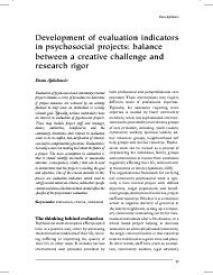Development of evaluation indicators in psychosocial projects: balance between a creative challenge and research rigor
Evaluation of psychosocial and community oriented projects includes a series of procedures to determine if project outcomes are achieved by an activity planned to help reach an individual or socially relevant goal. Typically, various stakeholders have an interest in evaluation of psychosocial projects. These may include project staff and manager, donors, authorities, beneficiaries and the
community. Sometimes their interest in evaluation seems to be in conflict, but clarification of interests can lead to complementary positions. Evaluation is basically a decision making tool about the future of a project. The basic assumption in evaluation is that it should identify observable or measurable outcomes (consequences, results) that can be used to demonstrate that the project is reaching the goal and objectives. One of the crucial elements in this process are evaluation indicators which need to satisfy several universal criteria, while their specific content and data collection method should reflect the specifics of the project under evaluation. Keywords: evaluation, criteria, indicators
Geachte bezoeker,
De informatie die u nu opvraagt, kan door psychotraumanet niet aan u worden getoond. Dit kan verschillende redenen hebben,
waarvan (bescherming van het) auteursrecht de meeste voorkomende is. Wanneer het mogelijk is om u door te verwijzen naar de bron
van deze informatie, dan ziet u hier onder een link naar die plek.
Als er geen link staat, kunt u contact opnemen met de bibliotheek,
die u verder op weg kan helpen.
Met vriendelijke groet,
Het psychotraumanet-team.
Reference:
Dean Ajdukovic | 2008
In: Intervention: the international journal of mental health, psychosocial work and counselling in areas of armed conflict, ISSN 1571-8883 | 6 | 1 | 29-38
http://www.interventionjournal.com/sites/default/files/6.1_05_Ajdukovic.pdf
In: Intervention: the international journal of mental health, psychosocial work and counselling in areas of armed conflict, ISSN 1571-8883 | 6 | 1 | 29-38
http://www.interventionjournal.com/sites/default/files/6.1_05_Ajdukovic.pdf


